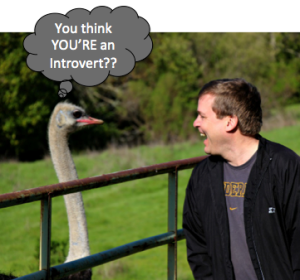Why I Love Being an Introvert
April 12, 2013 19 Comments
{Note: I am now blogging at my brand-spanking-new site, SteveWoodruff.com. Just click here to subscribe to the new feed. Bonus – you can also sign up at the same time for my astonishingly brief yet brilliant e-newsletter, Clarity Blend (see sample), and when you sign up, you’ll get a free download of my helpful new e-book, Make Yourself Clear: Six Steps to De-fogging Your Direction and Your Message.}
I didn’t always enjoy the fact that my wiring is definitely on the introvert side of the fence. Since our culture tends to value extrovert tendencies and behaviors, we who are quieter, who are more inclined to think before speaking, and who are energized more by alone time than by crowds can often feel marginalized or inferior.
Over time, I’ve shaken free of that perspective. I was born with this wiring, and though I’ve become much more outgoing and confident with people (some people now mistake me for an extrovert), I remain a thorough-going introvert.
 And I love it. Yeah, I said it. I love being an introvert.
And I love it. Yeah, I said it. I love being an introvert.
In a world filled with chatty and superficial crowds exchanging pleasantries and (often) little else of substance, I can sit down with people one-on-one or in intimate groups and really dive deep. To that place where minds and lives are changed. I love that.
While others desperately seek their inner fuel by surrounding themselves with others in social settings, I can enjoy alone time to think. In fact, I crave it – I’m energized by a combination of solitude and people time. And in those quieter times of reflection, insights arrive. I love that.
My inward-focused mind is always seeking to analyze and make sense of the world; and often, can be harnessed to help others make sense of their world. I love that.
I may not be the most glib person in a crowd – certainly not the life of the party – but I can write, and make presentations, and reach many more people that way, than pretending to be chatty Charlie. I love that, too.
In a world that often feels a compulsion to consume and consume and consume, introverts take time to digest. Life, for us, is not an endless carousel of coming-from-the-outside sensory stimulation. We regularly gain our strength from within – we’re more self-contained. And I love that.
No, the opposite of being extroverted is not being neurotic, as this poorly-conceived article implies. Extroverts have gifts and abilities and strengths. Introverts have gifts and abilities and strengths. And introverts have a lot to contribute to the world.
I love being an introvert. If you share that wiring, there’s no cause for shame or a sense of inferiority – we have our fit in this world, too; and it’s a rich place. Embrace who you are. Manage it. And make waves in your own way!












Recent Comments